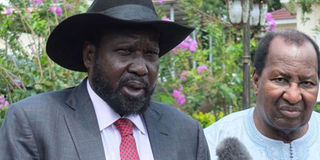S Sudan religious leaders want peace force sent to Juba

South Sudanese President Salva Kiir (left), flanked by African Union special envoy and former Malian President Alpha Oumar Konare, talks to the media on July 14, 2016 at the presidential palace in Juba. The South Sudan government opposes the proposed additional peacekeepers on the grounds that their mandate violates national sovereignty. PHOTO | AFP
What you need to know:
- Representatives from the 15 nations of the Council are in South Sudan to try to persuade President Salva Kiir to accept the deployment of a regional force — or face sanctions.
- A fresh wave of violence erupted in the country in July pitting Kiir’s troops against former rebel chief Riek Machar’s forces in Juba.
JUBA, Saturday
South Sudan’s religious leaders have called for the deployment of a protection force in Juba, during a meeting with ambassadors from the UN Security Council who are on a trip to the war-scarred country.
Representatives from the 15 nations of the Council are in South Sudan to try to persuade President Salva Kiir to accept the deployment of a regional force — or face sanctions.
The US ambassador to the UN Samantha Power insisted as she arrived in Juba that 4,000 additional African peacekeepers were needed.
The South Sudan government opposes the proposed additional peacekeepers on the grounds that their mandate violates national sovereignty.
A fresh wave of violence erupted in the country in July pitting Kiir’s troops against former rebel chief Riek Machar’s forces in Juba.
The upsurge threatened a fragile peace accord signed last year to end a devastating 18-month civil war which left tens of thousands dead.
“This force should come, and it should come now. I think this force will help us to implement the peace agreement,” Catholic Archbishop Paulino Lukudu Loro told reporters.
“As a country, we cannot address this mess alone. We cannot put the country back on track alone. And there is no humiliation in this need to be assisted.”
The UN mission in South Sudan has more than 13,000 troops but has faced criticism for failing to protect civilians, including dozens of women and girls who were raped near a UN base in Juba after a flareup of violence in the capital in early July.
South Sudan descended into war in December 2013 when Kiir accused his former deputy Machar of plotting a coup, and a peace deal signed last year was left in tatters during the July flare-up.
Anglican Archibishop Daniel Deng Bul supported the intervention call, saying the UN was “momentarily the father of the people of South Sudan”.
Church leaders carry strong moral authority in Christian-majority South Sudan and bishops have played an important role in brokering peace agreements.
During the fighting in July, Machar, who had been persuaded to return to Juba as part of the national unity government agreed under the peace deal, fled the country and is now in Khartoum, having been replaced by Taban Deng Gai in Juba.





